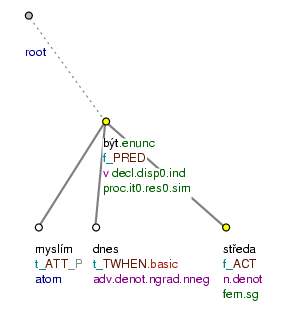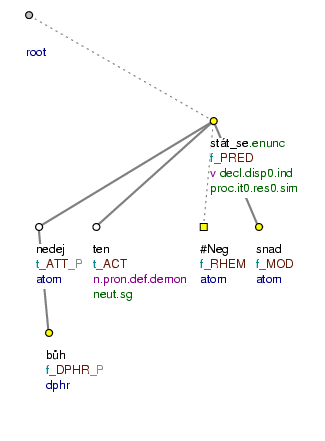Lexicalized parenthesis is a lexicalized, set parenthesis, which is turning into a mere particle. Lexicalized parentheses are formed by a finite verb form, which can have a residue of its valency requirements.
Examples:
Dnes je, myslím , středa. (=Today is Wednesday, I think) Fig. 6.118
To se, nedej bůh, snad nestane. (=This will, I pray, never happen) Fig. 6.119
To víte, dnes čas utíká tak rychle. (=Time flies, you know)
The effective root node of lexicalized parentheses are assigned the ATT functor (nodetype=atom). The t-lemma is the frozen present form, not the infinitive (see also Section 2, "The relation between a node's t-lemma and m-lemma and between its t-lemma and word form"). If there are any nodes modifying the effective root node of the lexicalized parenthesis, the get the DPHR functor (multi-word lexicalized parentheses are treated as non-verbal idioms; see Section 8.1, "Non-verbal idioms"). All nodes that are part of a (lexicalized) parenthesis have the 1 value in the is_parenthesis attribute.
The effective root node of a lexicalized parenthesis depends immediately on the effective root node of the clause the parenthesis is inserted in.
Expressions like bohudíky (=thank_God), zajisté (=sure), pochopitelně (=naturally) are not analyzed as parenthetic; they are usually assigned the ATT functor but the value of their is_parenthesis attribute is usually 0.

